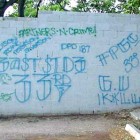
Beyond Scared Straight Producers Make Donation to Program Featured in Recent Episode
|
Sheriff Chipp Bailey, of Mecklenburg County, N.C., has confirmed to JJIE his office received a $10,000 donation from the producers of “Beyond Scared Straight” following the appearance of the county’s “Reality Program” on the controversial A&E television show. Bailey said the money, provided by Arnold Shapiro Productions, would be used to offset the costs of the food and field trips that are part of the aftercare portion of the “Reality Program." It is unclear whether the producers have made similar payments to other programs filmed for “Beyond Scared Straight”. The “Reality Program” is designed, according to Bailey, to educate at-risk youth on the realities of prison life and help them avoid making decisions that would land them in jail. In the initial portion of the program, teens are brought to the county jail, and dressed in prison uniforms while deputies intimidate, yell at and berate them.



